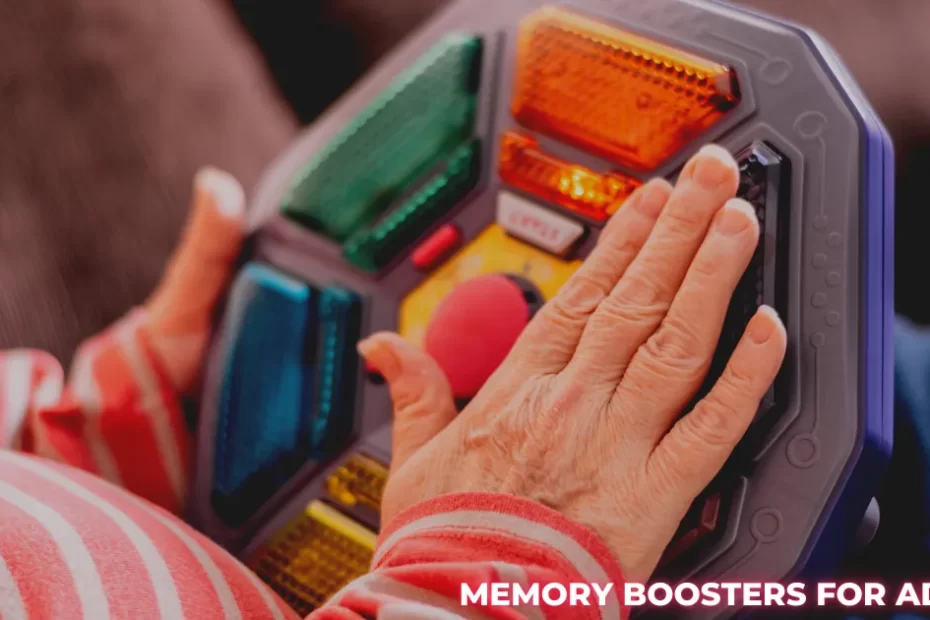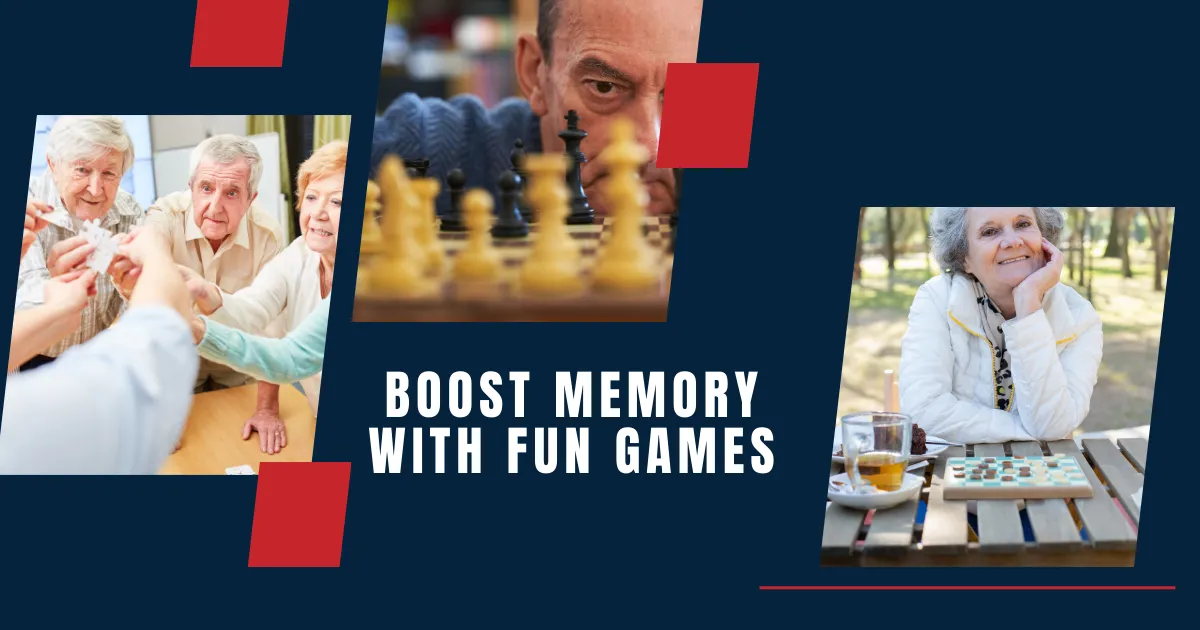Last updated on January 29th, 2024 at 08:33 am
Memory Games For Brain Health: Memory games for adults are not only fun but also a great way to exercise your brain. Whether you’re looking to boost your memory skills or simply enjoy a mental challenge, these games are perfect for beginners. Let’s explore three engaging memory games and the benefits they offer:
Benefits of Playing Memory Games For Brain Health:
Before we dive into the games, let’s quickly highlight the advantages of playing memory games for adults:
Enhanced Memory: Memory games help improve your memory retention and recall abilities, which can be beneficial in daily life.
Memory games are specifically designed to challenge the brain, making them an excellent tool for boosting memory retention and recall abilities.
- Retention Improvement: Engaging in these games requires the brain to remember and process information, reinforcing neural pathways associated with memory.
- Recall Speed: Regular practice can lead to quicker recall abilities, helping you remember information more rapidly in everyday life.
The repetitive and pattern-recognition nature of memory games means that engaging in them can help in ‘exercising’ the brain, much like how physical exercise strengthens muscles. This can lead to improved memory performance in both short-term scenarios, like remembering a shopping list, and long-term situations, such as recalling important personal events.
Cognitive Skills: They stimulate cognitive functions such as attention, concentration, and problem-solving.
Beyond memory enhancement, memory games can stimulate and improve various cognitive functions:
- Attention and Concentration: These games require focused attention to detail, training the brain to block out distractions and concentrate on the task at hand.
- Problem-solving and Critical Thinking: Many memory games present scenarios that require strategy and critical thinking, encouraging players to develop and apply different problem-solving techniques.
- Cognitive Flexibility: Memory games often involve adapting to new rules or changing environments, helping to promote cognitive flexibility and the ability to shift thinking patterns quickly.
Brain Health: Regularly engaging in memory games may promote overall brain health and potentially reduce the risk of cognitive decline.
Regular mental stimulation through memory games can contribute significantly to overall brain health:
- Neuroplasticity: Engaging in challenging activities can promote neuroplasticity, the brain’s ability to form and reorganize synaptic connections, especially in response to learning or experience.
- Cognitive Reserve: Building a cognitive reserve can help the brain become more resilient and could potentially delay the onset of cognitive decline.
- Mood and Stress: Playing games can be relaxing and enjoyable, helping to reduce stress levels, which is beneficial for overall brain health.
Table of Contents
ToggleFun Brain Games To Improve Memory
Game 1: Name Recall Challenge
How to Play:
- Gather a group of friends or family members.
- Each person takes a turn saying their name and an interesting fact about themselves.
- The next person must repeat the names and facts of all previous participants before adding their own.
Benefits and Cognitive Skills Targeted:
- Improves name recall and short-term memory.
- Enhances focus and attention.
- Promotes social interaction and active listening.
Tips for Improving Memory:
- Pay close attention when others introduce themselves.
- Use mental associations to remember names and facts. For example, connect a person’s name to a unique feature or interest they mentioned.
Game 2: Picture Pairs
How to Play:
- Create a set of cards with matching pairs of images or symbols.
- Shuffle the cards and lay them face down.
- Players take turns flipping two cards at a time, aiming to find matching pairs.
- The player with the most matches at the end wins.
Benefits and Cognitive Skills Targeted:
- Enhances visual memory and pattern recognition.
- Improves concentration and attention to detail.
- Provides a fun and interactive way to challenge memory.
Tips for Improving Memory:
- Focus on one pair at a time, and try to create mental associations with the images.
- Take your time and don’t rush—accuracy is more important than speed.
Game 3: Word Association
How to Play:
- Start with a random word, like “apple.”
- The next person must say a word that is related to “apple,” such as “fruit.”
- Continue the chain with each person linking a word to the previous one.
Benefits and Cognitive Skills Targeted:
- Boosts verbal memory and associative thinking.
- Encourages creativity and quick thinking.
- Promotes vocabulary and language skills.
Tips for Improving Memory:
- Make mental connections between words to remember them better.
- Challenge yourself by choosing more complex words or themes.
Cognitive Enhancement Through Memory Games
Working memory is a crucial component of human cognition and plays a significant role in memory games. It refers to the temporary storage and manipulation of information that is actively being used to complete cognitive tasks. Think of it as the mental workspace where your brain juggles information for a short period.
Here’s how working memory relates to memory games:
- Temporary Storage: Working memory allows you to temporarily hold and manipulate information. In memory games, you often need to remember various pieces of data, like card positions or sequences, for a short time. Working memory helps you keep track of these details as you play.
- Mental Flexibility: Memory games often require you to adapt and change your strategies as you progress. Working memory enables you to flexibly switch between different pieces of information and adjust your approach based on what you’ve observed or remembered.
- Problem-Solving: Many memory games involve solving puzzles or making decisions based on the information you’ve retained. Working memory aids in problem-solving by allowing you to analyze, compare, and apply the knowledge you’ve gathered during the game.
- Attention and Focus: To excel in memory games, you need to pay close attention to details and stay focused on the task at hand. Working memory plays a role in maintaining your attention and preventing distractions from interfering with your gameplay.
- Sequential Processing: In games that require remembering sequences or patterns, working memory helps you process and reproduce the information accurately and in the correct order.
- Learning and Improvement: As you play memory games repeatedly, your working memory can improve. You become more efficient at managing information, which can lead to better performance in the games and, potentially, enhanced memory skills in daily life.
In essence, working memory is like the mental “RAM” of your brain, allowing you to actively manipulate information, make decisions, and solve problems. Memory games are an excellent way to exercise and strengthen your working memory, ultimately enhancing your cognitive abilities and memory skills beyond the gaming context. So, the next time you engage in memory games, know that you’re giving your working memory a good workout!
Memory games that are particularly effective and enjoyable for older adults. Memory Games For Brain Health are designed to help improve cognitive functions like memory, attention, and problem-solving while being enjoyable and engaging. Here are a few memory games that are well-suited for older adults:
- Sudoku: Sudoku puzzles challenge memory, logic, and attention to detail. They come in various difficulty levels, making them suitable for seniors with different skill levels. Solving Sudoku puzzles regularly can help maintain and improve cognitive abilities.
- Crossword Puzzles: Crossword puzzles stimulate memory and vocabulary. They require recalling words, filling in blanks, and making connections between clues and answers. Crosswords can be found in newspapers, magazines, or online platforms.
- Memory Card Games: Classic card games like “Concentration” or “Memory” involve flipping cards to find matching pairs. These games require players to remember the location of cards they’ve seen before, making them excellent for memory training.
- Jigsaw Puzzles: While not a traditional memory game, jigsaw puzzles improve visual-spatial memory and attention to detail. Completing a jigsaw puzzle involves recalling the shapes, colors, and positions of various pieces.
- Brain Training Apps: Many apps and online platforms offer brain-training games specifically designed to enhance memory and cognitive skills. Games like Lumosity, Elevate, and Peak provide a variety of exercises that can be personalized to target specific areas of improvement.
- Word Searches: Word search puzzles challenge visual scanning and word recognition. They are not only fun but also help maintain language skills and memory.
- Board Games: Games like Scrabble, Boggle, or Bananagrams require word recall, strategy, and problem-solving. These board games offer both mental stimulation and social interaction, which is beneficial for older adults.
- Chess: Chess is a strategy board game that enhances memory, critical thinking, and planning. Playing chess regularly can provide a mental workout and foster strategic thinking.
- Online Memory Games: There are various online memory games and apps that are suitable for older adults. These games often offer a range of difficulty levels and can be played on smartphones, tablets, or computers.
Remember that consistency is key when it comes to memory improvement. Encourage older adults to incorporate these memory games into their routine, ideally on a daily or weekly basis. Additionally, combining mental exercises with a healthy lifestyle, including proper nutrition and physical activity, can have a positive impact on cognitive health in older age.
Conclusion and Final Tips:
Memory games for adults are not only entertaining but also offer a range of cognitive benefits. Incorporate these games into your routine to enjoy improved memory, enhanced cognitive skills, and a more agile mind. Remember to stay patient and persistent, as consistent practice is key to maximizing the benefits of memory games. So, gather your friends or family, and start challenging your memory while having a great time!



Thank you for sharing these insightful tips on memory games for brain health! It’s wonderful to see how engaging in these games not only provides entertainment but also offers numerous cognitive benefits. Incorporating these activities into our routines can indeed lead to improved memory, enhanced cognitive skills, and overall brain agility. Here’s to challenging our minds while having fun!